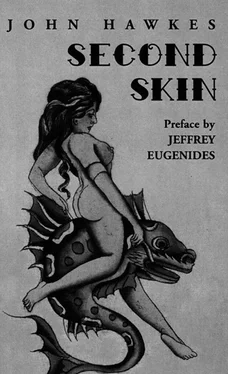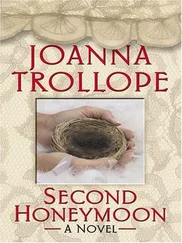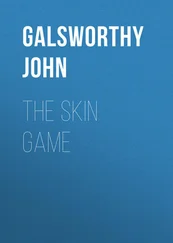And then: “You hear what I hears, Skipper?”
“I think so, Sonny. Do you mean the birds?”
“That’s it, Skipper. Birds. But birds don’t sing in the dark. Does they, Skipper?”
“It’s a special night, Sonny, a special night. That’s all. They’re singing for us.”
“Oh. I see. Well. So we got the night angels with us, is that it?”
“Sure, Sonny,” I said. “That’s it. But how’s the cigar? Burning OK?”
“She’s burning just fine, Skipper, just fine.”
Darkness. Shadows. Heavy dissolving moon. And it was the Night of All Saints as I knew it would be, and somewhere ahead I heard the soft voices in the cemetery and smelled the wax. And above us and hopping, fluttering, singing from branch to branch, Sonny’s night angels were keeping pace with us toward the heavy uncertain field of light that was hanging, suddenly, about knee-level beyond the vines, trees, velvet silhouettes of the banana leaves. We were the last to arrive, Sonny and Catalina Kate and myself and the baby, and standing together on the lip of that soft bowl and smiling, waiting, peering down at the illuminated graves — candles were already lit and flickering on most of those old graves — and at the shades of soft fat women and squatting men and children who were lighting candles, eating, laughing — the laughter was as soft as the song of the ground doves — it was hard to know whether all those shades were celebrants honoring the dead or the dead themselves preparing a little fete for Kate’s new child.
“Look at that grave, there, Sonny,” I whispered. “Looks like a birthday cake, doesn’t it, Sonny?”
We laughed then, Sonny and I, softly and gently laughed, and then we helped Kate and baby down the steep path into the sunken cemetery and the artificial day that was flickering and shifting in the heavy familiar darkness of our peaceful night. The floor of the cemetery was covered with sand, crushed shells, tall weeds. And all about us were the old graves that had settled long ago at steep angles into the powdery sand. And the homemade candles, the mere waxen stubs and living remnants of dull yellow light — I took a deep breath of tallow, smoke, spice, the wicks going down, and took in the shades and graves and little yellow teeth of light.
“Now, Catalina Kate,” I said quietly, “the choice is yours. Do you think you can pick us out a nice grave?”
In the heavy light of the artificial day our birds were crowding around the edge of the bowl, crowding around the lip of the bowl, and were singing, flitting, sighing with their little wings. Our night angels, as Sonny said. Our invisible chorus.
“That’s a beauty, Kate,” I murmured, “a marvelous choice.” And kneeling, shoving the cap to the back of my head, resting a hand on the raw stone: “OK, Sonny? If this one’s OK with you, let’s have the candles.”
It was an out-of-the-way grave at the far edge of the cemetery, a massive untended affair in the shadow of the trees that leaned down from the top of the bowl. No name. No dates. Long and broad and canted into the sandy earth and half-covered with weeds. A bottomless stone box driven into the sand among the little roots of the weeds, great monumental outline of old stone that had survived grief and that had no need of identity. I knelt there in the darkness and quickly swept the little lizards off the rim of it.
“More, Sonny, more,” I cried, “let’s give him a big light!” And listening to the birds, the women, the soft sound of Kate talking to the baby — Kate was sitting in the crook of an exposed tree root and guarding the baby, guarding the basket — Sonny and I, on hands and knees, inched our way together around the stone perimeter of that old grave, and one by one the gems of the crude diadem took fire, swayed, gave off their yellow light and the long black rising tails of candle smoke. We melted wax and stuck candles everywhere we could on the dark stone, I jammed lighted candles among the weeds in the center of that listing shape. The little flames were popping up all over the grave and suddenly the unknown soul was lighting up Sonny’s smile and mine and Kate’s, was glowing in Kate’s eyes and in the soft sweat on her brow.
So the three of us and the baby sat at the foot of the old dazzling grave, and Catalina Kate tore into the bread and cut the blood sausage into edible lengths while I broke open the French wine. Thick bread. Black blood sausage. White wine. And I propped myself up on Kate’s smooth dark rouge-colored young knee and ate, drank, felt the light of the candles on our cheeks. And then I asked Kate for a look at the baby, and there it was, the new face about half the size of her breast and three times as black and squeezed shut in a lovely little grimace of deep sleep.
“Who do you think it looks like, Kate? Sonny or me?”
And smiling down, tangling her shank of hair into the muslin and studying the small candlelit sheen of her first child: “Yes, sir. Him look like the fella in the grave.”
“Of course, Kate,” I said then, and laughed. “But just think of it. We can start you off on another little baby in a few weeks. Would you like that, Kate? But of course you would,” I said. Kate nodded, smiled, held the baby tight. And we finished the wine, packed the basket, waited for the moon to suck the last light of our candles into the new day. When we started back to Plantation House in the morning — this morning — I carried the baby in my own arms. Light as a feather, that baby. Good as gold.
So yesterday the birth, last night the grave, this morning the baby in my arms — I gave Uncle Billy’s crucifix to Kate this morning, I thought she deserved it — and this afternoon another trip to the field because Gloria was calling, calling for me. And now? Now I sit at my long table in the middle of my loud wandering night and by the light of a candle — one half-burned candle saved from last night’s spectacle — I watch this final flourish of my own hand and muse and blow away the ashes and listen to the breathing among the rubbery leaves and the insects sweating out the night. Because now I am fifty-nine years old and I knew I would be, and now there is the sun in the evening, the moon at dawn, the still voice. That’s it. The sun in the evening. The moon at dawn. The still voice.












